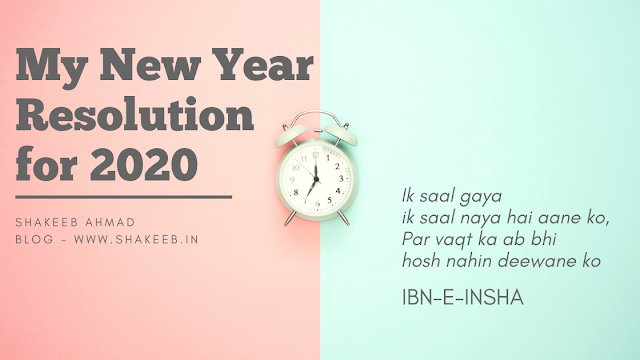This episode includes following tags:
Biology (1), Computer-Science (1), English (1), GK (1), Help (1), Language (1), Literature (1), Opinion (5), Philosophy (2), Programming (1), Psychology (3), Reform (1), Self (1), Self-Help (1), Theology (2)
I learn a lot of things every day, about diverse topics. Will write these things daily, even if it's obvious-to-the-level-of-dumb for the world.
— Shakeeb Ahmad, from My New Year Resolution
#LearnedToday 11
Without reading anything on God, I had this argument in mind. Most importantly, it... feels... right. And, I still haven't found a counter for this.The "unmoved mover", argument 1 of 5 by Aquinas for the existence of what we call God, is the most natural thought a human mind can have. Still, when I ask atheists every atheist about their opinion on this, each of them simply answered, "I don't know."
The"motion" here can actually be generalized as "change". So for every change, there's a cause and the chain goes on... but not infinitely. (See "Infinite Regression")
I personally think that being agnostic (I don't know) is good and humble, that's why most soft atheists choose to be that, but sometimes I feel they do it just to avoid the question.
Terms: Summa Theologica, Existence of God, Aquinas's five ways, unmoved mover Aristotle
Ref: Wiki
Tags: Theology, Opinion
#LearnedToday 12
Peace of Mind
When you've got that analytical skill to run psychological analysis of what's around you and know what tricks people are trying to play with you, you have a definite peace of mind. [ NOT because now you know them and can take revenge. ]Do their actions/intentions bother me? Maybe. But most of the time, those little acts of selfish nature bring smile on my face. Not a derogatory one, Wallahil Azeem, but for their innocence. الحمد للّٰہ علی ذلک۔
Only if they knew what this world is worth.
Tags: Philosophy, Opinion, Psychology
#LearnedToday 13
I'd always considered "Jack of all trades and the master of none" as a negative phrase. That's not true. (With a vast range of interests, I often complain that I'm not doing justice to any of them. That's when I use this comment for myself.)Luckily, I stumbled upon the Wikipedia page of this figure of speech, and I quote:
The full phrase is "Jack of all trades, master of none is often times better than a master of one."
The shortened version "a jack of all trades" is often a compliment for a person who is good at fixing things, and has a very good broad knowledge.
So, it is actually a complement. The "master of none" part makes it a little unflattering though.
Tags: Literature, English Language
#LearnedToday 14
After 6-7 years, there are people who are still fighting over the same issues which rarely affect our lives, worldly or spiritual.I wonder how many years would it take for them to realize what other chores they are leaving behind which are far more important, for them. For the humanity.
And when you try to tell them to move on, they stubbornly try to drag you in the same fight you'd left years ago.
Then you realize why Allah said this:
“And when the ignorant address them [harshly], they say [words of] peace.” (Al Quran - 25:63)
Tags: Theology, Opinion
#LearnedToday 15
Just saw a TEDx talk on how schools are making kids less intelligent.Have recently discussed this with my sister (or some friend, can't remember), that the
Inspect yourself now. Whatever you've learned, how much was the schools'/college's contribution in that?
Not saying they don't play any role, but I'm more of the idea that rather than grades, the system should be classified based on students' tendencies, skills and natural inclination. More on this in a blog post some time.
Ref: https://youtu.be/2Yt6raj-S1M and its comments
Tags: Opinion, Reform
#LearnedToday 16
Logging the data in the console for debugging is quick and easy, and that's what you must be using too. But what do you do? console.log("output") like me?There are a lot more you can do with console. Some of them are
console.log({var1, var2}); //Adds labels
console.table([var1, var2]); //Displays as table
console.time() and console.timeLog(); //Gives time between two console logs
I'll be using the first one definitely. Had to manually add labels everytime.
Tags: Computer Science, Programming
#LearnedToday 17
Chanakya- an ancient Indian guru, philosopherوہ لوگ جو کمائی سے زیادہ خرچتے ہیں، اپنے سے زیادہ طاقتور سے پنگا لے بیٹھتے ہیں اور جو عورتوں سے بہت بات کرتے ہیں ( ان میں گھرے رہنا پسند کرتے ہیں، فلرٹ کرتے ہیں)، انہیں تباہی سے کوئی نہیں بچا سکتا۔
- چانکیہ
Wo log jo kamaai se zyada kharchte hain, apne se zyada taqatwar se panga le baitthte hain, aur aurton se bahot baat karte hain, unmen ghira rehna pasand karte hain (flirting) unhen tabaahi se koi nahin bacha sakta.
- Chanakya
The last point. It's specifically targeted towards men, and there's a reason for that. They are men who loose their mind talking to women, while women usually stay normal.
All of us have seen someone who ruined/ is ruining their life after this.
Ishq ne Ghalib nikamma kar diya,
Warna ham bhi aadmi the kaam ke
#LearnedToday 18
There's a trait of close friends -“We can be with them without talking.”
That rarely happens with close friends, I know. But still, when you're with a new friend / stranger, you have a sort of responsibility to keep the conversation flowing. Nod your head nonstop mechanically, listen to completely irrelevant or redundantly told stories, just to be a part of conversation, somehow. Because if there's silence, it would be "awkward silence".
There are no awkward silences with friends.
Tags: Opinion, Self Help, Psychology
#LearnedToday 19
Have to read this book now."Influence: The Psychology of Persuasion by Robert B. Cialdini"
6 Principles of Persuasion
Reciprocity: Simply put, people are obliged to give back to others the form of a behavior, gift, or service that they have received first.Scarcity: Simply put, people want more of those things they can have less of.
Authority: This is the idea that people follow the lead of credible, knowledgeable experts. What the science is telling us is that it’s important to signal to others what makes you a credible, knowledgeable authority before you make your influence attempt. Of course this can present problems; you can hardly go around telling potential customers how brilliant you are, but you can certainly arrange for someone to do it for you.
Consistency: People like to be consistent with the things they have previously said or done.
Liking: People prefer to say yes to those that they like.
But what causes one person to like another? Persuasion science tells us that there are three important factors. We like people who are similar to us, we like people who pay us compliments, and we like people who cooperate with us towards mutual goals.
Consensus: Especially when they are uncertain, people will look to the actions and behaviors of others to determine their e.g: Cards, signs which suggests something. We do that.
Ref: https://www.influenceatwork.com/principles-of-persuasion/
Tags: Psychology, Self Help
#LearnedToday 20
The tear glands in our eyes are connected to the nostrils internally. So that water coming out of your nose while crying is not snot. That's mainly tears. 😁Ref: https://youtu.be/egEraZP9yXQ
Tags: GK, Biology














